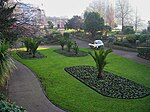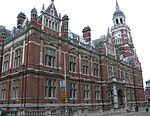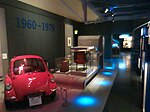Ruskin House
Co-operatives in the United KingdomGeorgian architecture in LondonGrade II listed buildings in the London Borough of CroydonGrade II listed houses in LondonHouses in the London Borough of Croydon ... and 1 more
John Ruskin

Ruskin House, situated in its own grounds on Coombe Road, Croydon, South London, has been a centre of Britain's progressive movements for a century. It is the headquarters of the Communist Party of Britain and Croydon's Labour, Trade Union and Co-operative movements and is itself a co-operative with shareholders from organisations across the four movements.
Excerpt from the Wikipedia article Ruskin House (License: CC BY-SA 3.0, Authors, Images).Ruskin House
Coombe Road, London
Geographical coordinates (GPS) Address Phone number Website External links Nearby Places Show on map
Geographical coordinates (GPS)
| Latitude | Longitude |
|---|---|
| N 51.3675 ° | E -0.096666666666667 ° |
Address
Coombe Road 23
CR0 1BD London (London Borough of Croydon)
England, United Kingdom
Open on Google Maps










